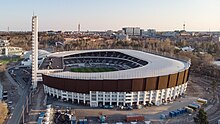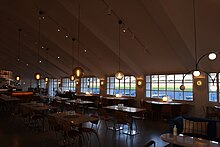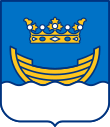Helsinki Olympic Stadium
| Helsingin olympiastadion Helsingfors Olympiastadion | |
"Stadikka" | |
Helsinki, Finland | |
| Coordinates | 60°11′13″N 024°55′38″E / 60.18694°N 24.92722°E |
|---|---|
| Owner | Stadion-säätiö |
| Capacity | 36,251[1] |
| Field size | 105 m × 68 m (115 yd × 74 yd)[citation needed] |
| Surface | Grass |
| Construction | |
| Broke ground | 12 February 1934 |
| Opened | 12 June 1938 |
| Renovated | 1939, 1947–1952, 1953–1956, 1961, 1971, 1991–1994, 1997–1998, 2004–2005, 2010–2011, 2016–2020 |
| Architect | Yrjö Lindegren and Toivo Jäntti |
| Tenants | |
| Finland national football team Finnish Athletics Federation | |
| Website | |
| www | |
The Helsinki Olympic Stadium (
The stadium was also the venue for the first Bandy World Championship in 1957, the first and 10th World Athletics Championships, in 1983 and 2005. It hosted the European Athletics Championships in 1971, 1994 and 2012. It is also the home stadium of the Finland national football team.
The stadium reopened in August 2020 after 4 years of renovation.[2]
History

The Olympic Stadium was designed by the architects Yrjö Lindegren and Toivo Jäntti. The Olympic stadium, known as an icon of functionalist style of architecture, was featured in the Architectural Digest as one of the best examples of Olympic architecture.[3] Yrjö Lindgren later became himself an Olympic medallist when he received the gold medal for architecture at the 1948 Olympics in London.[4]
Construction of the Olympic Stadium began in 1934 and it was completed in 1938, with the intent to host the 1940 Summer Olympics, which were moved from Tokyo to Helsinki before being cancelled due to World War II. It hosted the 1952 Summer Olympics over a decade later instead. The stadium was also to be the main venue for the cancelled 1943 Workers' Summer Olympiad.
It was the venue for the first ever Bandy World Championship in 1957.
The stadium was completely modernized in 1990–1994 and also renovated just before the 2005 World Championships in Athletics.[citation needed]
In 2006, an American TV series, The Amazing Race 10, had one of its episodes ending at The Olympic Stadium Tower. As a task, teams had to do a face-first rappel (known as the Angel Dive) down the Helsinki Olympic Tower.
Since March 2007, a Eurasian eagle-owl has been spotted living in and around the stadium. On June 6, 2007, during a Euro 2008 qualifying match, the owl delayed play by ten minutes after perching on a goalpost. The owl was later christened Bubi and was named as Helsinki's Resident of the Year.[citation needed]
The 50th anniversary of the Helsinki Olympic Games hosted in the Helsinki Olympic Stadium was the main motif for one of the first Finnish euro silver commemorative coins, the 50th anniversary of the Helsinki Olympic Games commemorative coin, minted in 2002. On the reverse, a view of the Helsinki Olympic Stadium can be seen. On the right, the 500 markka commemorative coin minted in 1952 celebrating the occasion is depicted.
There were plans to host the 2021 Superpesis finals at the Olympic Stadium, but opposition from the clubs about preferring best-of-5 finals instead of a single match, worries about the playing surface (Playing on natural grass and running track surface, in a sport that prefer artificial grass and sand), and scheduling conflicts,[5] led the plan to be called off.
Features


The stadium's spectator capacity was at its maximum during the 1952 Summer Olympics with over 70,000 spectator places. Nowadays the stadium has 36,251 spectator places. During concerts, depending on the size of the stage, the capacity is 45,000–50,000.
The tower of the stadium, a distinct landmark with a height of 72.71 metres (238.5 ft), a measurement of the length of the gold-medal win by Matti Järvinen in javelin throw of 1932 Summer Olympics.
A
Recent




Major renovation work at the stadium started in the spring of 2016. During renovation all the spectator stands were covered with canopies and the field area and the tracks were renewed. The stadium now also offers extended restaurant areas and more indoor sport venues.[6] The renovation was completed and the stadium was open to the public in September 2020.
The projected cost of the renovation was expected to consume €197 million in 2016, €261 million in 2019 and ended up at a price of €337 million, which is €140 million (or 70 percent) more than the original projected cost. The Finnish state and the City of Helsinki are the funders of the renovation.[2][7]
Events

Sport events
- 1952 Summer Olympics
- 1957 Bandy World Championship
- 1971 European Athletics Championships
- 1983 World Championships in Athletics
- 1994 European Athletics Championships
- 2005 World Championships in Athletics
- UEFA Women's Euro 2009 (4 Group matches and a Final)
- 2012 European Athletics Championships
- 2022 UEFA Super Cup[8]
Concerts
See also
References
- ^ UEFA
- ^ a b "Olympiastadionin korjauksen hintalappu kallistumassa jälleen – vuosia remonttivasaran alla olleen stadioinin määrä avautua elokuussa". mtvuutiset.fi. 9 November 2019. Retrieved 14 December 2019.
- ^ Minutillo, J.: The best Olympic architecture. Architectural Digest, 16 August 2016.
- ^ "Yrjö Lindegren". Olympedia. Retrieved 11 August 2020.
- ^ "Pesisfinaalia puuhataan Olympiastadionille, nurmelle kipattaisiin hiekkaa – idealle täystyrmäys" (in Finnish). Iltalehti. 12 May 2021. Retrieved 24 December 2023.
- ^ Modernisation and renewal of the Helsinki Olympic Stadium Archived 24 December 2014 at the Wayback Machine Retrieved on 20 December 2014
- ^ StadiumDB.com: Helsinki: Olympiastadion is great but the price isn’t, 23.01.2021
- ^ "UEFA". Twitter. Retrieved 27 March 2020.
🗓 BREAKING: The 2022 UEFA #SuperCup final will be held in Helsinki, Finland, at the Olympic Stadium.
External links
![]() Media related to Helsingin olympiastadion at Wikimedia Commons
Media related to Helsingin olympiastadion at Wikimedia Commons
- 1952 Summer Olympics official report. pp. 44–7.
- Stadion.fi – Official site
- History of the stadium Archived 19 September 2018 at the Wayback Machine
- Panoramic virtual tour from the stadium tower




